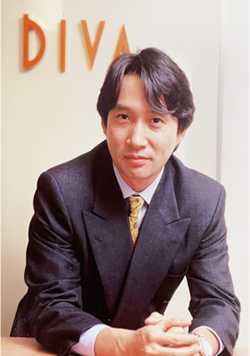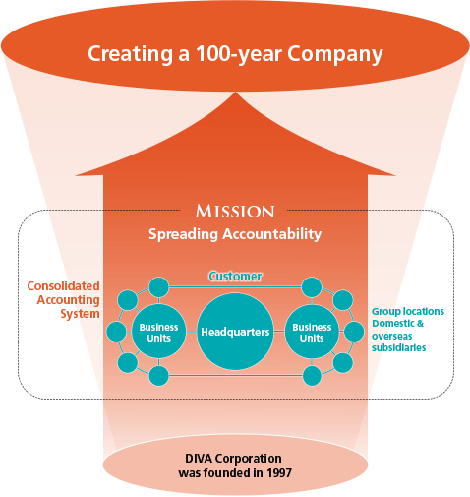Start business focusing on consolidated accounting system
The primary objective of the listing was to strengthen governance, not to raise funds.
Visualize management information to support highly transparent decision-making—Although there was a basic idea that led to the current corporate mission, I honestly did not see how I should embody it at that time.
Management information is composed of everything from financial information to data related to production, inventory, and sales, and there is no technology to integrate this information. In the first place, I did not understand anything about managing a business or organization.
Among my thoughts at that time, there was one growth factor that leads to the Avant Group now. I found opportunities in an information system, not a mission-critical system.
Mission-critical business system literally supports the fundamentals of business activities and are not frequently replaced once they are introduced. Competition was somewhat close to an end with foreign-affiliated companies gaining share.
On the other hand, information systems, while they account for only a few percentages of total system investment, but it has to be continuously customized and updated, and a vendor could expect sustainable sales stream while strengthening customer relationships.
This idea is the starting point for the current Avant Group‘s growth strategy of “recurring sales business rooted in real demand.”

While being aware of a variety of issues, I only had a vague vision of the future. It was in 1995 when I was clearly aware of entrepreneurship.
I got the information that consolidated financial statements will become mandatory five years later in 2000 as part of the so-called “Accounting Big Bang” trend, in which the accounting systems of domestic companies are globalized. I felt that it was a chance!
I was developing consolidated accounting system at the time.
My system had two important elements: technological superiority and the feasibility of achieving the mission, both of which were important factors in deciding to start a business.
“Technological superiority”—I have invented, this was a self flattery, a system in which data modeling design can be done with SQL language and shortened the consolidation process, which at the time took five to six hours, to five minutes, the system that can be operated without knowing programming languages and other matters.
It was an overwhelmingly superior system to the auditing firm-affiliated system, which we competed at the time.
The other element “feasibility of achieving the mission” meant that the consolidated accounting system could be a foundation for visualizing management information or spreading accountability.
Consolidated accounting systems contain financial statements that serve as the basis for business planning, such as sales, profits, and costs. The data in these financial statements can be used as a common language for decision making and can be reconfigured in various ways to be utilized at the business site to plan and execute growth strategies.
Based on the consolidated accounting system, we will support the decision-making of Japanese companies by evolving this system and create “strong Japanese companies.” I was determined to grow together with our customers.
This was the moment when the idea of starting a business and the image of the organization became clear.
In 1997, DIVA Corporation was established as a spin-out with my colleagues. DivaSystem, a consolidated accounting system developed by the company, has created a whirlwind in the marketplace, and in about five and six years since its establishment, the win rate in the competition has been almost 70-80%. It was very smooth sailing.
Of course, however, corporate society is a competitive society. In order to prevent our progress, in 2002 competing products that thoroughly researched our products appeared, and the win rate suddenly declined.
Our company that has grown steadily since its founding exposed its weakness in foothold.
In discussions with executives, who founded the Company together, each other‘s values clashed.
Discussions on the future continued for more than a year, we remained divided in our opinions.
I was troubled by the fact that my colleagues were denying each other the value that we had been trying to provide to our customers: a democratic and transparent decision-making system.
—I was filled with fear that I might suffer like my father and abandon my original intention. In such a cornered situation, I went back to my starting point and made the biggest decision of my life. Public offering.
When I was watching my father‘s distress, I thought that the management of a company was to build a management system with a monitoring function, namely, who and how to make decisions while ensuring fairness. In other words, that “governance is all about human resources.”
However, at that time I was in a situation in which I was unable to make objective decisions trapped in a mix of my own private feelings of wanting to get along with the members of the founding period, and the personal dreams and commitments of individual executives.
So, I decided to return to the starting point of the company‘s foundation and take on the challenge of creating a company where governance actually works.
In other words, the primary objective of the DIVA’s listing was to introduce overwhelming checks and balances in business strategies and personnel, and to strengthen governance, not to raise funds.
I thought it should be the best choice for both shareholders and employees if this company can continue to grow together with its customers, even if the check-and-balance function dismissed me.
In February 2007, we listed our shares on the Osaka Securities Exchange’s Hercules (now TSE JASDAQ). We have officially established a corporate philosophy, ”Creating a 100-Year Company” to express our determination to become a company that lasts 100 years, equipped with a transparent decision-making system that has never been disrupted by governance again.
